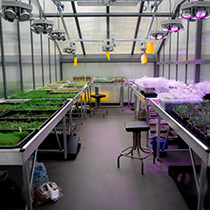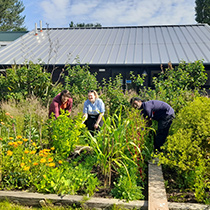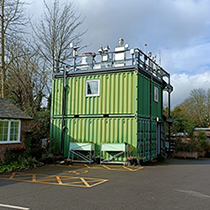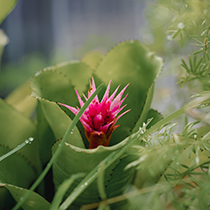
The Firs environmental research station
Situated in the heart of the University’s Fallowfield campus is a green oasis for research, teaching and community engagement.
Discover more about each of our areas of activity:
Research
The Firs has a range of facilities available for environmental research, with research projects covering ecology, crop sciences, atmospheric sciences, geography engineering, history, poetry and much more.
Research facilities
-
Research greenhouse
Opened in 2020, our facility provides 14 individually controlled environmental chambers, each with 13 m2 of bench space, including facilities for growing genetically modified plants. Temperatures can be controlled in the range 15-30 C. Energy-efficient LED lighting allows plant growth throughout the year. Lab facilities include bench space, balances, drying ovens, cold room and freezers, laminar flow hood and autoclave.
-
Outdoor growth space
For larger scale experiments under more natural conditions, we have space either in a polytunnel or outdoors, with flexible areas, available for pot experiments or for plants in the ground.
-
Manchester Air Quality Supersite
The site houses an air quality research laboratory that can gather detailed data on the contents of harmful urban air pollution; working out where the gases and particles that pollute our air are coming from and how they form in the air.
The site was funded as part of a £6m investment into three new air quality supersites (the other sites are in the University Birmingham and King’s College London) established by the Natural Environment Research Council (NERC).
Read more about the data being collected
-
Plant collection
The Firs houses an extensive and expanding living plant collection, with species from around the world, both indoors and out. These are accessible for research purposes and we are developing a database of taxonomic and genome sequence information. Manchester Museum also has an extensive collection of historic preserved plants, located within their herbarium. If you’d like to see the different biomes, check out our virtual tour.
Research case studies
Breeding crops for improved food security
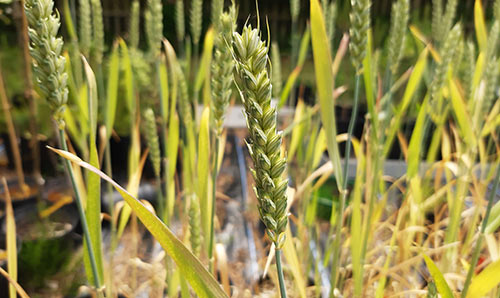
Environmental change is leading to crop losses across the world. Recent work in Manchester has identified a strategy to develop plants with increased tolerance of environmental stress, by breeding a “safety valve” into photosynthesis, which protects against stress-induced production of harmful free-radicals.
We are trialling this approach in wheat, oil seed and soya.
Developing technologies for smart agriculture
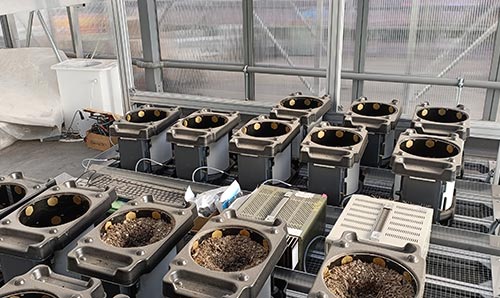
Smart agriculture seeks to use sensing technologies to monitor crop growth. At the Firs a team led by Professor Bruce Grieve has been developing systems to follow in real time the growth of crops both above and below ground. This can be applied to phenomics approaches to speed the breeding of climate-smart crops.
Microalgae fermentation
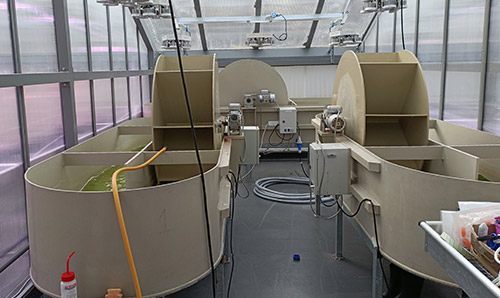
The microalgal growth facility in the Firs Greenhouse allows the pilot-scale cultivation of microalgae in small raceway-style ponds of up to 600 L. Microalgae are of interest to researchers and to industry for their potential uses for a wide variety of applications, including as sustainable sources of biochemical. These applications include use of microalgal biomass for nutrition and health, pharmaceuticals, cosmetics, bioenergy, biomaterials, animal feed, biofertilisers, and for pollutant removal or nutrient recovery from waste-streams. These ponds allow us to test conditions at a larger scale and to demonstrate that characteristics that we see in the laboratory at small scale (such as 200 mL) can be replicated at a much larger scale. We are also using the ponds to perform computational modelling and prediction of mass cultivation conditions to allow the improvement of biomass production.
Recent microalgal work in the facility has been funded through the EnhanceMicroAlgae project. Contact Konstantinos Theodoropoulos from the Department of Chemical Engineering and Jon Pittman from Department of Earth and Environmental Science for any questions about our work.
The SoilResist project: Diversity, stability and functioning of the soil microbiome
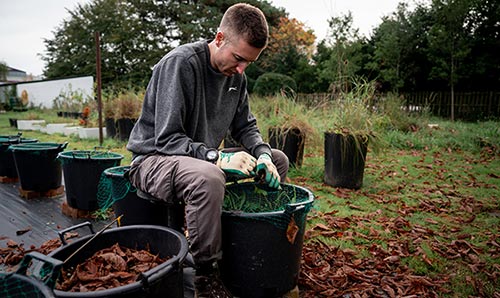
Droughts are becoming more frequent and more intense, and pose a major threat to the functioning of terrestrial ecosystems. Essential ecosystem services, including carbon storage, and the release of nutrients for plant growth, depend on the activity of microorganisms in the soil. Such activities are often limited by water availability; hence drought can severely perturb ecosystem functions through its impacts on soil microbes. The SoilResist project will investigate what factors may contribute to the capability of soil microbes to a) resist drought impacts and b) to recover from them, such that ecosystem functions are restored.
Our mesocosm experiment at the Firs Botanical Grounds explores the roles of ongoing nitrogen pollution, grassland plant community composition, and their potential interactions, on the soil microbiome’s resistance to, and recovery from, drought. We use a full-factorial experimental design to identify potential drought thresholds – i.e. how severe a drought must be before ecosystem functioning is irreparably impacted - and how management may influence where this threshold lies.
We hypothesise that nitrogen pollution will erode the capacity of microbes to resist drought, but a more species-rich and functionally-diverse plant community will enhance microbial resistance.
Discover more about the Firs
Read our blogs:
Find us
Get in touch with the Firs team, or come and find us in person:
Address
The Firs Environmental Research Station
The University of Manchester
Fallowfield Campus
Whitworth Lane
Manchester
M14 6HE
- E: firs@manchester.ac.uk
- T: +44 (0)161 257 2772
- University's interactive map
| Follow us on Instagram |







